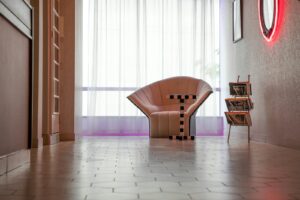Among the myriad choices, glued-down vinyl flooring has emerged as a popular option due to its durability, versatility, and affordability. However, like any flooring material, it comes with its own set of advantages and drawbacks. In this article, we delve into the pros and cons of glued-down vinyl flooring to help you make an informed decision.
Pros
Durability: Glued-down vinyl flooring boasts remarkable durability, resisting scratches, stains, and moisture. Its robust nature ensures longevity, making it ideal for high-traffic areas.
Versatility: Offering a wide array of styles, colors, and patterns, glued-down vinyl flooring provides versatility in design. Whether replicating the look of hardwood, tile, or stone, it caters to diverse aesthetic preferences.
Easy Maintenance: With simple cleaning routines and minimal upkeep requirements, maintaining glued-down vinyl flooring is hassle-free. Unlike some flooring materials, it retains its appearance with little effort.
Affordability: Cost-effective in both material and installation expenses, glued-down vinyl flooring presents an economical option compared to alternatives like hardwood or tile.
Comfortable Underfoot: Glued-down vinyl flooring offers a softer and more comfortable surface compared to materials like tile or concrete, making it a cozy option for areas where you’ll be standing for extended periods.
Sound Absorption: Its composition and installation method contribute to better sound absorption, reducing noise transmission between floors and creating a quieter environment overall.
Moisture Resistance: Being resistant to water damage, vinyl flooring can handle high-humidity environments well, making it suitable for areas prone to moisture such as basements or bathrooms.
DIY-Friendly Maintenance: While professional installation is recommended, maintenance and repairs are often manageable for DIY enthusiasts, saving on long-term maintenance costs.
Cons
Installation Process: Achieving optimal results may require professional installation, as improper application can lead to issues like uneven seams or adhesive failure. Additionally, the adhesive used during installation may emit volatile organic compounds (VOCs), necessitating proper ventilation.
Vulnerability to Damage: Despite its durability, glued-down vinyl flooring is susceptible to damage from heavy objects or sharp items. Unlike hardwood or tile, repairing damaged sections can be challenging, potentially requiring replacement.
Environmental Concerns: Some vinyl flooring products contain harmful chemicals, posing environmental and health risks. Disposal can also be problematic, as vinyl is non-biodegradable and may release toxins if incinerated.
Limited Value Addition: While offering practical benefits, glued-down vinyl flooring may not significantly increase a property’s resale value compared to natural materials like hardwood or tile. Perception of lower quality by some buyers could also impact its marketability.
Susceptibility to Fading: Direct exposure to sunlight over time can cause vinyl flooring to fade, particularly in areas with large windows or skylights, potentially altering its appearance unevenly.
Limited Environmental Sustainability: Despite advancements in eco-friendly options, vinyl flooring’s production process and non-biodegradable nature pose environmental concerns, making it a less sustainable choice compared to some alternatives.
Potential for Off-Gassing: Some vinyl flooring materials may emit volatile organic compounds (VOCs) after installation, leading to indoor air quality issues and potential health risks, especially in poorly ventilated spaces.
Difficulty in Repairing Subfloor Damage: Unlike floating vinyl flooring options, glued-down vinyl requires a flat, smooth subfloor for installation. Repairing or leveling damaged subfloors can be challenging and may require professional intervention.
Read more
Click-lock vs Glue-Down Vinyl Flooring
Vinyl Plank Flooring vs Vinyl Sheet Flooring




